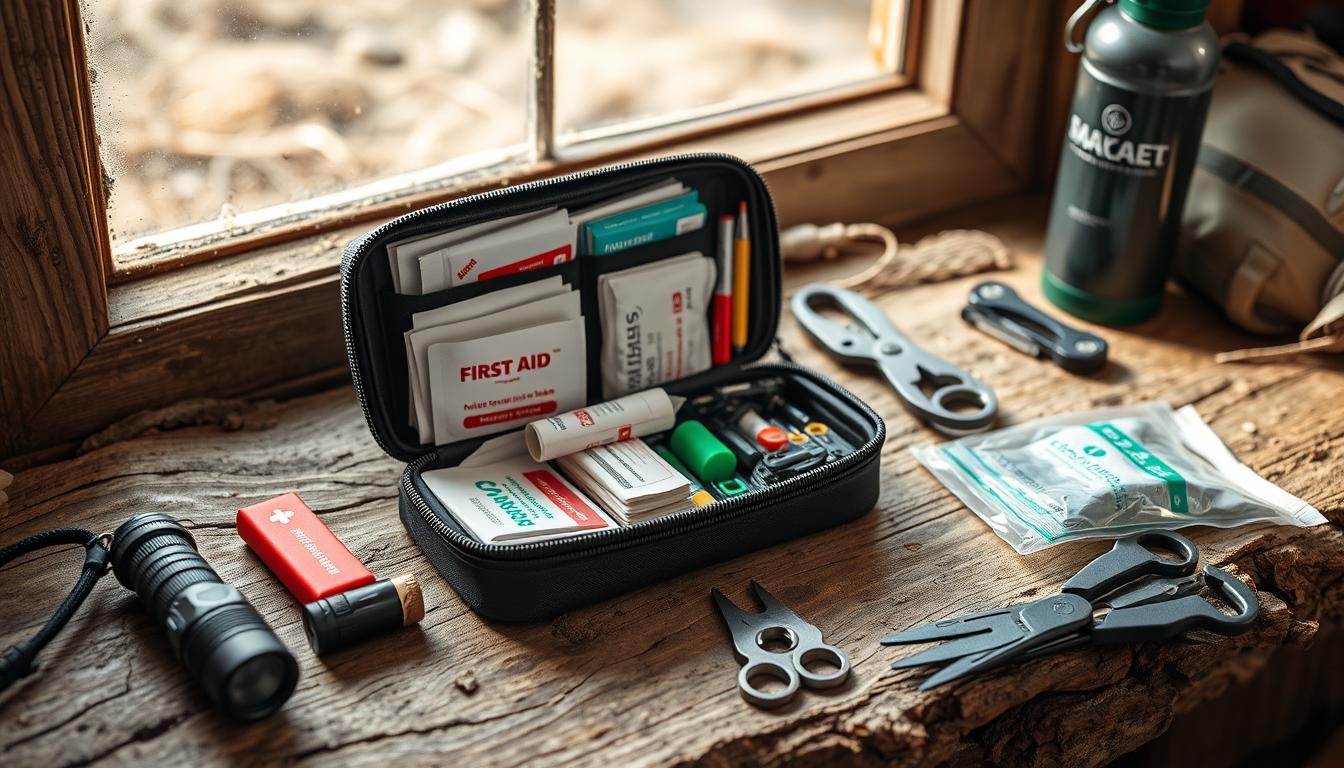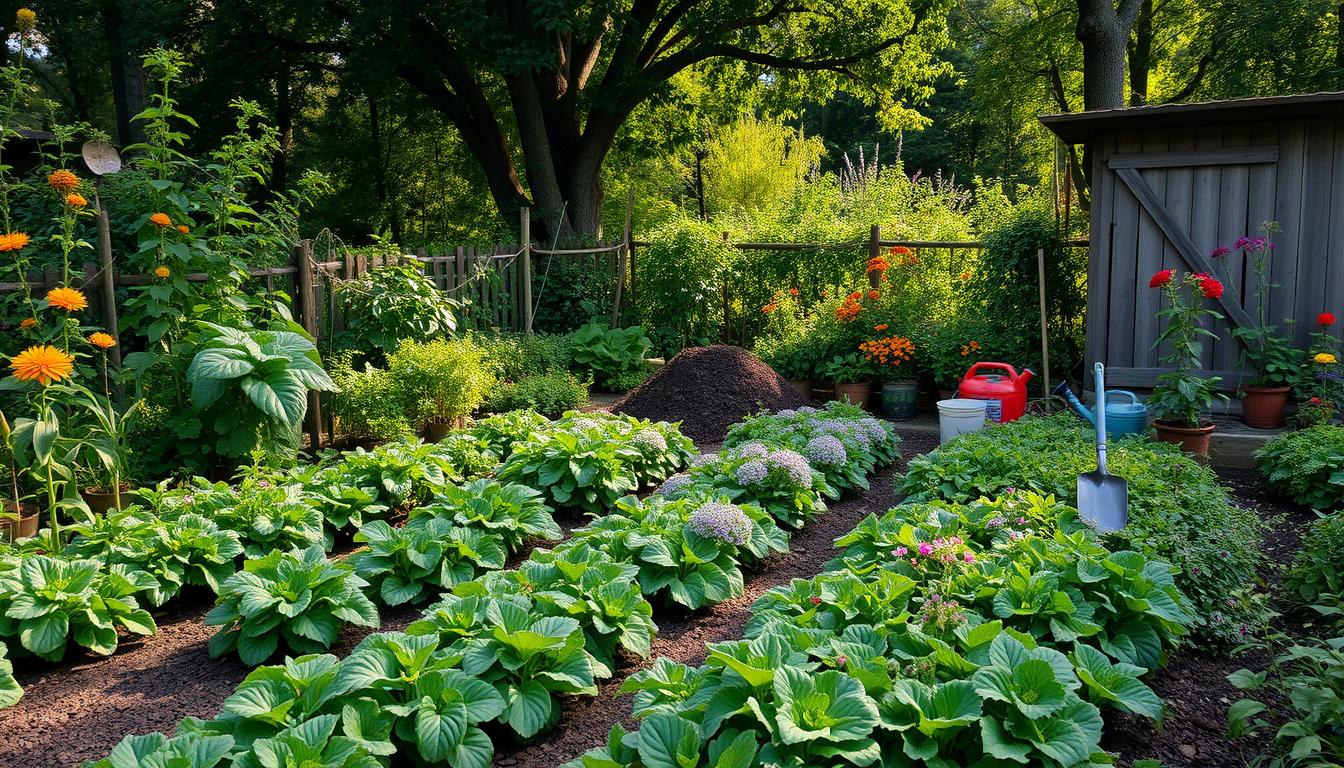In today’s world, being mentally prepared and resilient is key. We face many challenges like natural disasters, economic problems, and health crises. How we handle these can greatly affect our well-being. This article will share ways to build mental strength for tough times.
Key Takeaways
- Understand the psychological impact of crises and develop a resilient mindset
- Cultivate a positive outlook and utilize stress management techniques
- Maintain physical health and build a strong support network
- Acquire practical survival skills, including basic first aid knowledge
- Learn to cope with uncertainty and accept what you cannot control
Understanding the Importance of Mental Preparedness
In times of crisis, our mental health can suffer a lot. The sudden events can make us feel anxious, stressed, and even depressed. That’s why mental preparedness is key – it helps us bounce back when things get tough.
The Psychological Impact of Crises
Crises, like natural disasters, pandemics, or economic problems, can shake our sense of normalcy. They can make us feel scared, unsure, helpless, and sad. Without the right ways to cope, these feelings can really harm our well-being.
Developing a Resilient Mindset
Building resilience is crucial for getting through tough times. By thinking positively and being flexible, we can see challenges as chances to grow. This way, we can handle crises with purpose and control, not just feeling lost.
Some ways to build resilience include:
- Practicing self-care and stress management
- Finding a supportive group of friends
- Thinking positively and focusing on what you can change
- Doing things that make you feel good mentally and physically
By focusing on mental preparedness and resilience, we can handle the mental ups and downs of crises better. This proactive way can make us stronger, more flexible, and ready for what comes next.
Cultivating a Positive Outlook
Keeping a Positive Mindset is key for Mental Preparedness in tough times. By changing negative thoughts to positive ones and focusing on what you can control, you build a strong mindset. This mindset helps you get through hard times.
Practicing gratitude is a good way to stay positive. Spend a few minutes each day thinking about what you’re thankful for, even if it’s small things. This helps you not get stuck on problems or worries.
It’s also helpful to focus on what you can control, not what you can’t. Look at your life and see where you have control. Work on your habits, how you react, and how you use your time.
“The only thing we can truly control is our own thoughts and actions. By focusing on what’s within our power, we can find strength and resilience in the face of adversity.”
Lastly, see challenges as chances to grow and learn. Crises can help you learn new skills, strengthen relationships, or give you a new view on things. Seeing things this way can turn a tough time into a chance for personal growth.
By working on a Positive Mindset and Mental Preparedness, you can face crises with more confidence and strength. With time, this way of thinking can be a powerful tool for dealing with life’s ups and downs.
Stress Management Techniques
Dealing with tough times can really take a toll on our mental health. But, there are ways to manage stress that can help us bounce back stronger. Practices like deep breathing and mindfulness meditation can ease anxiety, sharpen focus, and help us become more resilient.
Deep Breathing Exercises
Slowing down and focusing on our breath can greatly reduce stress. Techniques like the 4-7-8 method engage the parasympathetic nervous system, which helps our body relax. By breathing deeply, we can fight off the stress effects and feel calmer.
Mindfulness and Meditation
Mindfulness and meditation are key in managing stress. They teach us to be fully present and understand our feelings without judgment. Regular practice can lessen anxiety and depression, and boost our thinking and emotional control.
Adding these Stress Management methods to our daily routine can really change how we handle tough times. It helps us build Resilience and stay composed when things get hard.

“The greatest weapon against stress is our ability to choose one thought over another.” – William James
Mental Preparedness & resilience during a crisis
Dealing with a crisis is more than just knowing how to survive. It’s also key to be mentally ready and resilient. This part talks about how to keep your mind strong and bounce back after tough times.
Being adaptable is key in managing a crisis. When things are unpredictable, being able to change plans and find new solutions is crucial. Having a way to solve problems helps you face challenges boldly, not letting fear or doubt stop you.
Being able to control your emotions is also crucial for staying resilient. Learning how to handle stress and anxiety helps you stay calm and make smart choices, even when things are tough. Things like deep breathing, being mindful, and talking positively to yourself can help with this.
“The greatest weapon against stress is our ability to choose one thought over another.” – William James
Having a positive attitude is also a strong way to get through crises. By focusing on what you can control, seeing the good in tough times, and staying hopeful, you can keep your mental strength up. This helps you stay resilient when things get hard.
Remember, being mentally prepared and resilient are skills you can learn and improve. By taking care of your mental health, you’ll be ready to handle any crisis better.
Building a Support Network
Having a strong support network is key during tough times. It helps keep your mind ready and resilient. Your family and friends offer emotional, practical, and psychological support. This support is crucial for getting through hard situations.
The Role of Family and Friends
Your loved ones are crucial in helping you deal with stress and uncertainty. They give you a listening ear, make you feel part of a group, and keep you connected. It’s important to talk openly with them and stay in touch regularly.
This way, you feel supported and not alone. Here are some tips:
- Lean on your loved ones for emotional support and comfort
- Involve your family and friends in your crisis preparedness planning
- Regularly reconnect with your support network, even if it’s through virtual means
- Offer support and assistance to your loved ones as well, creating a reciprocal relationship
Remember, a strong support network is a big help in getting ready for a crisis. Taking care of these relationships makes you feel safe, strong, and ready to face challenges.
Maintaining Physical Health
Being resilient isn’t just about staying strong in our minds. It’s also about keeping our bodies healthy. When we face tough times, being physically fit helps us cope and bounce back. It gives us the strength and energy to deal with challenges more easily.
Good eating, regular workouts, and enough sleep are key to staying resilient. Eating well gives our bodies the right nutrients and energy. Exercise lowers stress, makes us happier, and keeps us fit. And getting enough sleep helps our bodies recover, keeps our minds sharp, and balances our emotions.
- Embrace a Nutritious Diet: Eat whole foods full of vitamins, minerals, and antioxidants. Include lots of fruits, veggies, lean meats, and whole grains in your meals.
- Engage in Regular Exercise: Do a mix of cardio, strength training, and stretching exercises. This will boost your health and resilience.
- Prioritize Quality Sleep: Try to get 7-9 hours of good sleep each night. This lets your body rest and get ready for the next day.
Remember, taking care of your body and resilience are connected. By focusing on your health, you’re looking after your overall well-being. This helps you handle life’s ups and downs with more ease.

“The greatest weapon against stress is our ability to choose one thought over another.” – William James
Developing Practical Survival Skills
When an emergency hits, having survival skills can make all the difference. Learning basic first aid is key. It lets people give immediate care and could save lives in tough situations.
Basic First Aid Knowledge
Knowing basic first aid can greatly help in an emergency. Important skills to learn include:
- Administering CPR (Cardiopulmonary Resuscitation)
- Treating wounds and controlling bleeding
- Handling burns and scalds
- Recognizing and responding to signs of shock
- Treating sprains, strains, and fractures
Learning these skills boosts Survival Skills and helps with Emergency Preparedness. It makes people better equipped to handle tough situations and help others.
“The greatest weapon against stress is our ability to choose one thought over another.” – William James
Learning survival skills like basic first aid is key to mental strength. By practicing these skills, people can feel more ready and able to act in emergencies.
Coping with Uncertainty
When crisis hits, the unknown can feel scary and overwhelming. But learning to adapt and stay strong in the face of uncertainty is crucial. By accepting things we can’t change, we focus on what we can do. This helps us find purpose even in chaos.
Accepting What You Can’t Control
Understanding what we can’t control is vital in dealing with uncertainty. We might not know what will happen next, but we can decide how we react. By accepting the things we cannot change, we make room to focus on what we can do.
- Identify the factors within your control and those that are beyond your influence.
- Develop a flexible mindset that allows you to adapt to changing circumstances.
- Practice mindfulness techniques to stay grounded in the present moment.
“The only thing we can truly control is our response to what we cannot control.” – Unknown
By embracing uncertainty as an opportunity for growth and resilience, we can handle crises better. This mindset helps us deal with the present and prepares us for the future.
Being able to Uncertainty and keep Resilience is key to getting through tough times. By knowing what we can’t change and focusing on what we can, we gain strength and flexibility. This helps us face even the most uncertain times.
Conclusion
Mental preparedness and resilience are key for handling crises and uncertain times. By having a positive outlook and learning stress management, you can stay calm and focused. Building a strong support network also helps a lot.
Keeping your body healthy, learning survival skills, and dealing with uncertainty are important too. These strategies help you be mentally ready for anything. They’re useful not just for big challenges but also for daily life. This makes you more confident in handling life’s ups and downs.
Getting better at mental preparedness and resilience is an ongoing journey. It’s not just something you do once. It’s about growing, learning, and getting stronger every day. With hard work and determination, you can build the skills to overcome any challenge and come out stronger.







